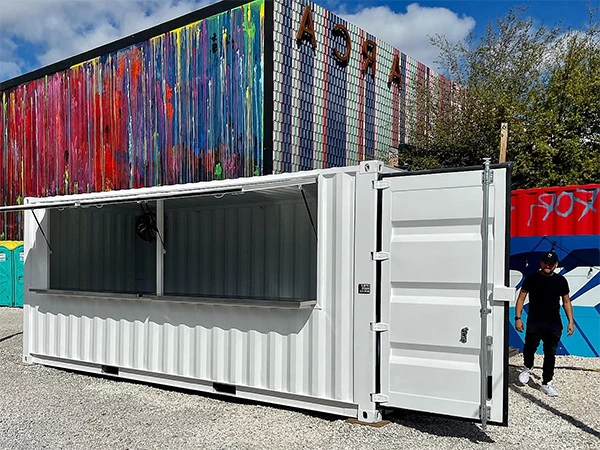Shipping Container Shop: Needs, Advantages and Solutions
What is a Shipping Container Shop?
Want to open a unique little shop but don't want to deal with building permits, construction noise, and muddy shoes? Custom Container Stores are here! These aren't just any containers; they're factory-ready, ready-to-use products. Customize your container with your desired color, size, doors, windows, display shelves, and even electrical outlet placement. Simply put, it's like Lego blocks, but they grow into your dream shop. Place them anywhere—on a street corner, in a mall, or by the sea—for an instantly eye-catching and eco-friendly store. Start your business right from the box and let it soar!
Amidst the current surge in commercial space homogeneity and the high cost of traditional construction, container shops, with their unique industrial charm, flexible adaptability, and high cost-effectiveness, are becoming a rising star in new retail, outdoor commerce, and the pop-up economy. They not only recycle discarded containers in an environmentally friendly way, but also break the rigid structure of traditional commercial spaces, providing entrepreneurs and brands with low-cost, high-efficiency, and highly personalized business solutions.
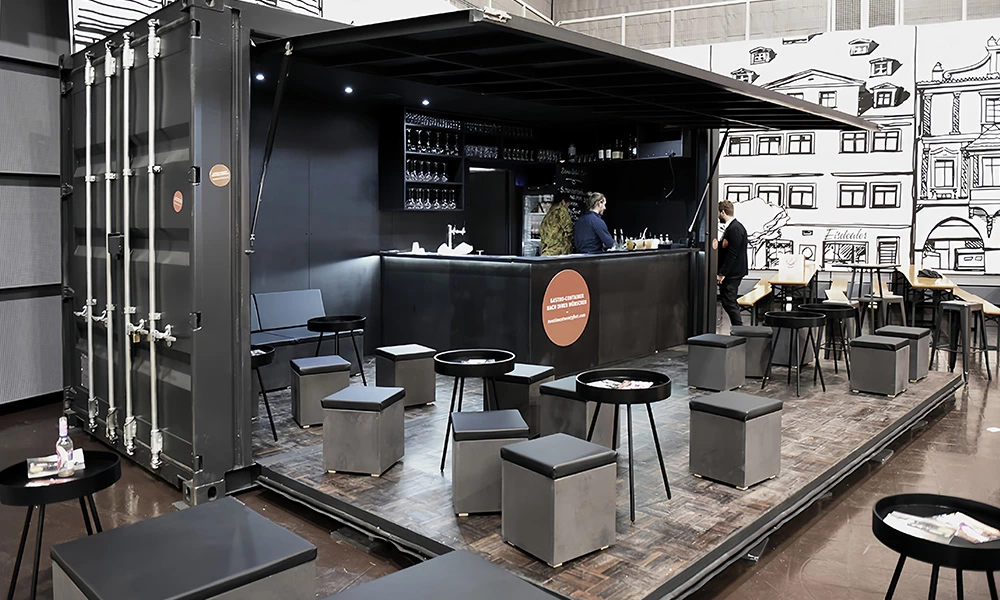
What scenarios and needs can container stores meet?
With their flexible customization, container shops can be integrated into a variety of business scenarios, becoming a versatile platform for diverse business models.
1. Leisure and Consumption Scenario: Creating a Personalized Social Space
Container Bars: With their industrial-style exterior and warm interior, they can be transformed into popular outdoor bars or private family bars. Whether in a courtyard, terrace, or at an event, they can become a crowd-pleasing "social center."
Container Cafés: Small and flexible spaces can be located in parks, corners of shopping districts, or near office buildings. Their unique design and convenient service meet consumers' diverse coffee needs.
2. Functional Service Scenario: Filling the Gap of Niche Needs
Container Kitchens: Suitable for temporary settings such as outdoor events, music festivals, and markets, they provide standardized food preparation space, balancing hygiene and efficiency, solving the catering challenges of large-scale events.
Trade Show Booths: Modular design makes booth construction more efficient. Merchants can customize the exterior and interior to suit the exhibition theme, making their booths stand out from the crowd and attract visitors' attention.
3. Retail Operation Scenario: Flexible Adaptation to Market Changes
Container Retail Stores/Pop-up Stores: For emerging brands or seasonal products (such as holiday gifts or summer beverages), container pop-up stores can be quickly deployed in popular shopping districts, reducing long-term rental costs. Furthermore, their unique spatial design can spark consumer curiosity, increasing store visits and purchases.
4. Sports Service Scenario: Focusing on the Exclusive Needs of Stadium Clubs
Stadium Club Shops: Leveraging the portability and customizability of containers, these shops can be precisely located around sports venues such as padel courts, basketball courts, and tennis courts, serving as "sports supply stations" for players and spectators. The interior is zonal: one side features a sports equipment area for sale or rental of jerseys, sneakers, protective gear, and other supplies, with steel shelves reserved for storage. The other side houses a beverage and snack area, equipped with refrigerated cabinets for storing sports drinks and energy bars for immediate post-workout hydration. A foldable terrace can be added to the exterior for a temporary rest area with casual seating. The exterior can also be customized to match the club's branding, with team logos or event slogans emblazoned on the exterior for enhanced brand recognition. Furthermore, for temporary events (such as weekend friendlies and amateur leagues), the shop can be flexibly relocated to the venue for quick deployment and vacated as needed afterward, eliminating the need for idle, fixed-store space and perfectly meeting the cyclical operational needs of stadium clubs.
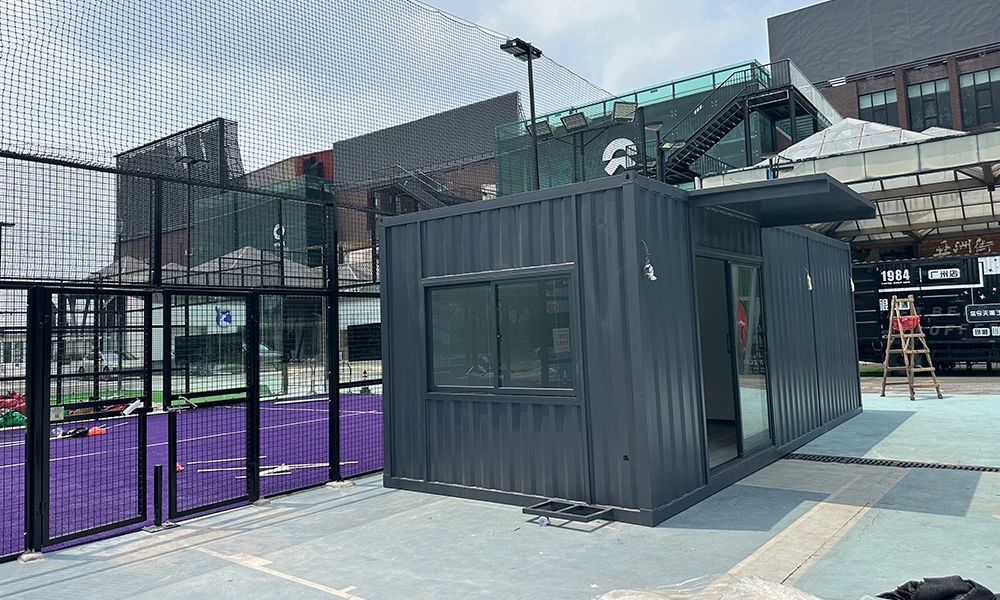
Core Advantages of Container Shops
The rapid rise of container shops stems from their outstanding advantages in cost, efficiency, and flexibility, addressing the pain points of traditional commercial spaces on multiple fronts.
1. Controllable Costs: Lowering the Barrier to Entrepreneurship and Operation
Compared to building a shop from scratch or renting a traditional commercial space, container shops have significantly lower initial costs. Galvanized steel containers are inherently affordable and do not require complex foundation construction. If entrepreneurs are unsure about the market prospects, they can test customer response through a "trial rental" model, avoiding the risk of large upfront investments and significantly lowering the barrier to entry.
2. Efficient Turnaround: Accelerated Return on Investment
Traditional commercial buildings often take months or even longer from design to completion. However, container shops, thanks to their modular construction, significantly shorten the construction cycle. Whether creating a single store or a modular retail space, they can be quickly implemented, saving labor costs and allowing businesses to open earlier, accelerating their return on investment.
3. Highly Customizable: Adaptable to Diverse Business Needs
Container shops offer far greater customization than traditional spaces. The exterior can be cut and modified to add doors, windows, terraces, and roll-up doors. The interior can accommodate vinyl flooring, plywood lining, insulation, and other finishes. They can also be stacked and combined to create unique roof and terrace designs tailored to the brand's positioning. Whether it's a retail store, mobile shop, bookstore, or pop-up shop, customized designs can achieve a balance of function and style.
4. Secure and Portable: Balancing Durability with Operational Flexibility
Containers are constructed from high-quality weathering steel, resistant to wear and weather, and able to withstand the harsh outdoor environment. Equipped with high-security doors, they effectively prevent theft and vandalism, ensuring operational safety. More importantly, their portability allows businesses to easily relocate their stores to new locations based on customer traffic, seasonality, or event needs, flexibly responding to market changes.
5. Green and Environmentally Friendly: In line with sustainable business trends
Container shops utilize steel as their core material, which is reusable and recyclable. This avoids the waste of traditional building materials and reduces dependence on natural resources. This "environmentally friendly reuse" concept not only meets current consumer demand for green consumption but also helps brands establish a positive "sustainable" image, enhancing brand favorability.
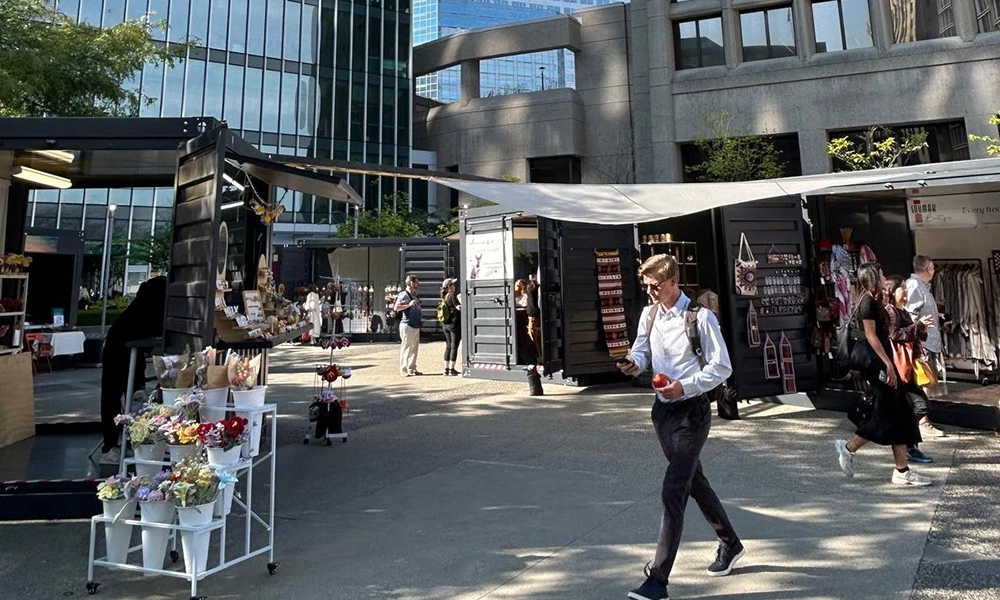
What is the price range for customized container shops?
With UVO's custom solutions, container shop prices typically range from $3,000 to $5,000, with specific pricing varying depending on the functional requirements of the specific application scenario. For example, a basic container coffee shop (consisting solely of a countertop, simple storage racks, and basic lighting) typically costs $3,000-3,500 due to its minimalist configuration. More complex stadium and club shops (requiring additional refrigerated cabinets, tiered steel racks, folding terraces, and non-slip flooring) can cost $4,000-5,000 due to the added customization and workmanship. Trade show booths that incorporate brand-specific finishes, modular display racks, and multimedia equipment also fall in the mid-to-high-end price range. This fully demonstrates the flexible "demand determines price" pricing model, allowing merchants to choose a solution based on their budget and functional priorities.
What are the steps for buying a customized container shop?
To create a unique container shop, you must follow a scientific process to ensure both functionality and safety, while also aligning with your brand positioning.
Preliminary Planning: Clarifying Requirements and Functional Layout
First, consult with an architect or container conversion specialist to determine core functions based on business needs. For example, a retail store requires display and storage areas, a coffee shop requires a counter and seating area, and a stadium or club shop requires equipment, supply, and rest areas. Next, determine the location of personnel doors, windows, roller shutters, and service hatches (for example, adding a window in the supply area for convenient food pickup) to lay the foundation for subsequent renovations.
Basic Modification: Build Core Facilities Systems
Based on the planned doors, windows, and service areas, cut the main container structure. Simultaneously, UVO will help you determine the location of electrical connections, ventilation systems, and plumbing (for example, refrigerators in a stadium or club shop require separate circuits). This ensures the proper functioning of basic functions like water, electricity, and ventilation, avoiding rework later in the renovation.
Interior Decoration: Balancing Practicality and Aesthetics
Use cladding materials to conceal electrical wiring and plumbing, ensuring a clean and uncluttered space. Choose interior materials appropriate to the location. For example, restaurants can opt for waterproof and wear-resistant vinyl flooring, retailers can use plywood or melamine lining, and equipment areas in stadium and club shops can use non-slip and wear-resistant metal flooring for easy cleaning and maintenance. Furthermore, install thermal insulation on the walls and floors to enhance comfort (especially for outdoor environments with high or low temperatures).
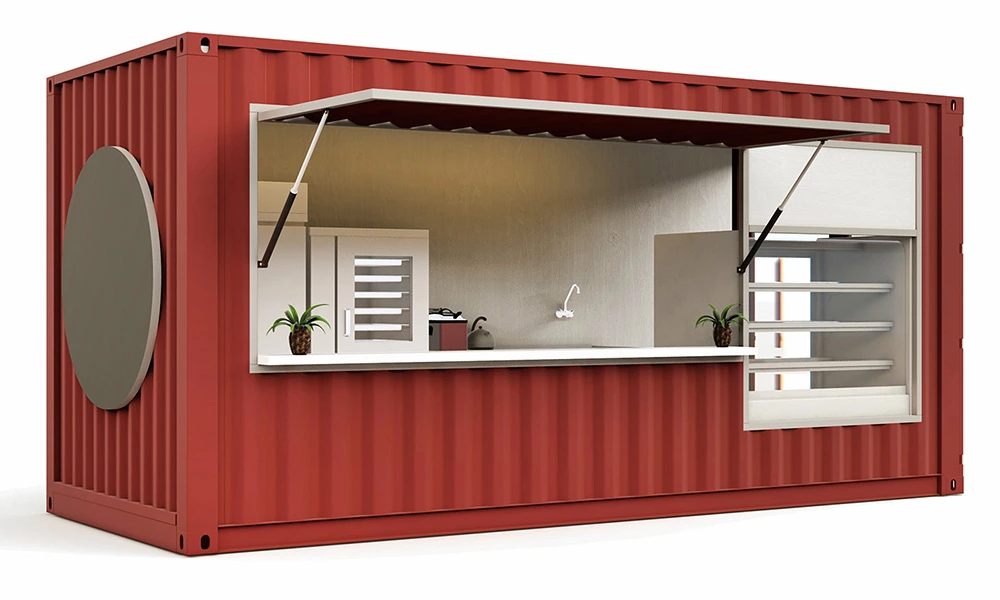
Space Optimization: Planning Interior Structure and Storage
Design interior partitions based on business needs to divide functional areas. Reserve space for steel racks and shelves to create ample storage space and avoid clutter that disrupts the customer experience. For example, retail stores can incorporate multi-tiered shelving, coffee shops can create corner equipment storage areas, and stadium and club shops should design tiered steel racks for protective gear, jerseys, and other equipment, with dedicated space for refrigerators and lockers.
Brand Implementation: Reinforce Identity Through Color and Details
Finally, choose paint that complements the brand's color palette for the store's exterior and interior, complementing it with the brand logo, slogan, or creative graphics. For example, a store in a stadium or clubhouse can incorporate the team's primary colors and emblem, while a leisure-oriented store can use fresh, bright colors. This allows the container store to become an "extension" of the brand image, enhancing consumer recognition and memory.
UVO Customized Container Shop Solutions
With a variety of sizes and extensive renovation options, UVO's custom container shops offer the perfect solution for businesses of all sizes and formats. Whether it's a pop-up retail space, a cafe or restaurant, or a large, multi-functional store, we can help you quickly implement your unique business vision.
Container Shop Size Options:
10ft Container
- Ideal for small retail stores, beverage stations, or pop-up events.
- Compact, quick to install, and highly portable.
- Can be used as a temporary exhibition stand or supplemental space in an existing store.
- Flexible and cost-effective, it's ideal for startups or testing new markets.
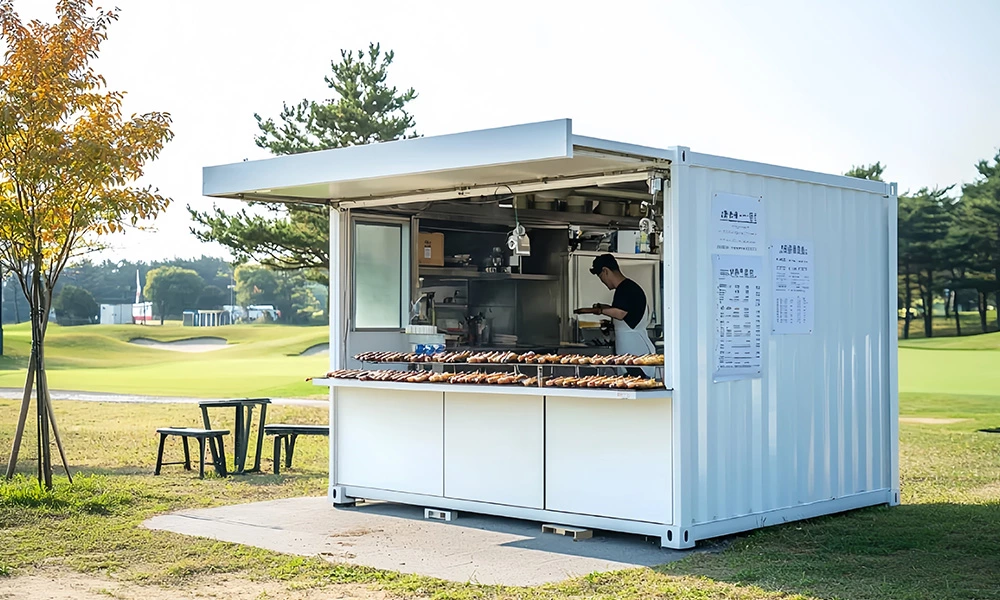
20ft Container
- A classic choice that balances space and convenience.
- Ideal for independent cafes, small restaurants, or mobile business expansions.
- Can accommodate a more extensive menu, ample seating, and workstations.
- A standard solution for entrepreneurs and small businesses.
40ft Container
- Large-capacity design allows for a full kitchen, dining area, and storage.
- Able to handle high customer traffic, it's suitable for businesses that primarily offer dine-in dining and comprehensive services.
- Ideal for locations in busy commercial districts or tourist attractions.
- They offer the potential for brand display and large-scale service.
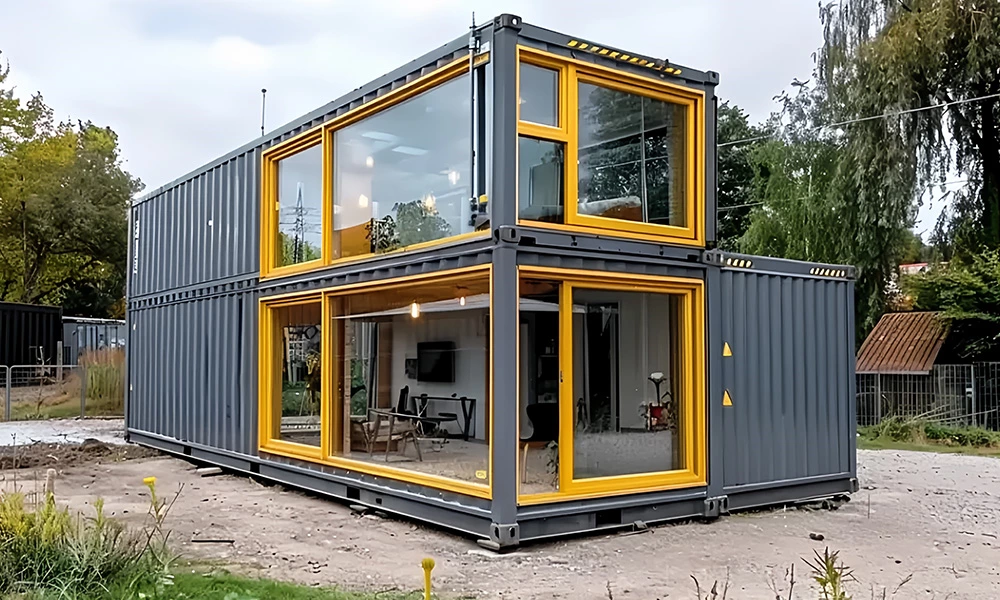
High-cube containers (20ft / 40ft)
- They are one foot taller than standard containers.
- They are suitable for creating lofts, adding storage space, or creating a more spacious atmosphere.
- They are often used in businesses that prioritize a sense of space, such as cafes and bars.
- They maximize vertical space within a limited footprint.
Double-width configuration
- Place two containers side by side and remove interior walls to create a wider interior space.
- This allows for more seating and a larger kitchen, making it ideal for events and gatherings.
- The flexible layout is particularly suitable for high-traffic settings such as dining, leisure, and entertainment.
- They also create a more open feel, enhancing the customer experience.
Multi-container combination configuration
- Multiple containers can be combined to create multi-level or partitioned structures.
- This allows for functional areas such as dining, leisure, storage, and kitchen.
- Create a unique commercial complex, such as a large-scale café, fast-food restaurant, or multi-functional retail center.
- Offering endless design possibilities, it's ideal for high-end, unique business models.
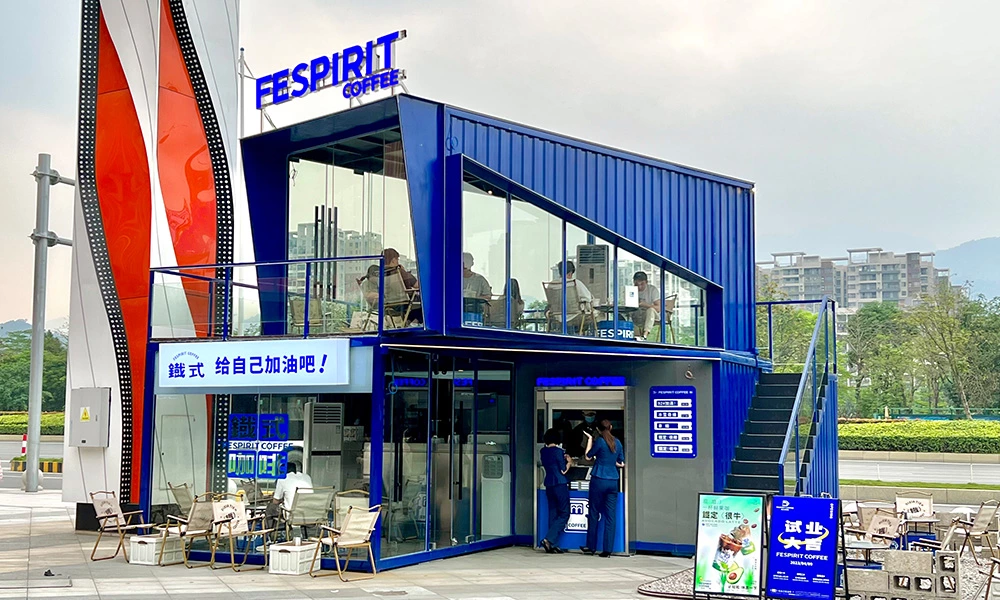
Container Shop Conversion Options
Concession Windows
- Customizable in size and location.
- Efficient ordering and pickup, ideal for fast food and beverage establishments.
- Available with traditional counter-style or modern sliding windows to meet diverse style needs.
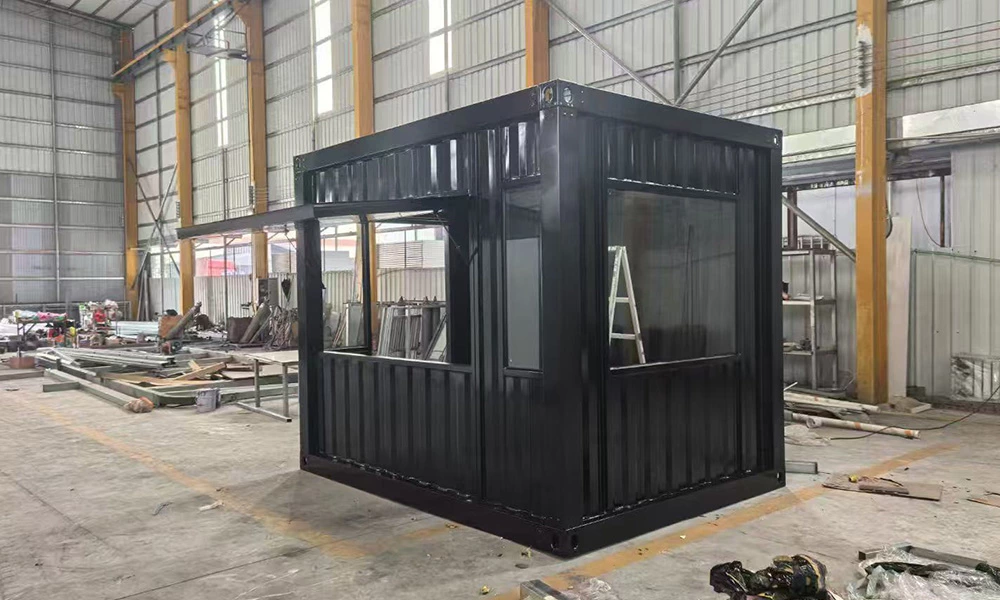
Drive-Thru Windows
- Designed for fast-paced customers, offering more efficient service.
- Increasing convenience and sales for cafes and restaurants.
- Helping businesses expand their customer base and attract grab-and-go customers.
Rooftop Deck
- Use the rooftop to create an open-air lounge or viewing platform.
- Increase seating capacity and create a unique atmosphere.
- Perfect for small events, parties, or al fresco dining.
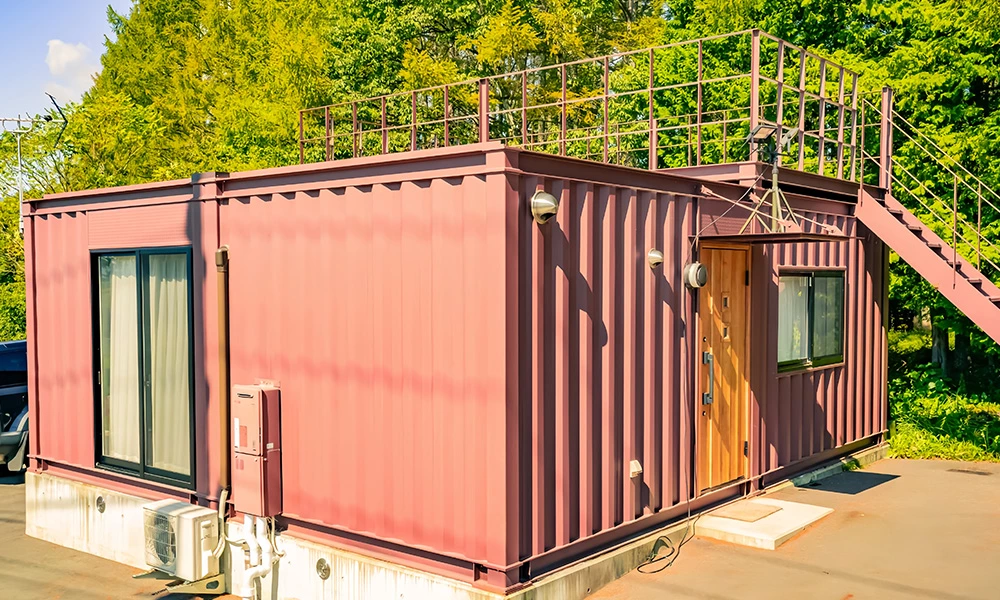
HVAC
- Provide a comfortable environment year-round.
- Ensure customer comfort, whether in the sweltering summers or the chilly winters.
- Important for employee productivity and store operations.
Lighting Design
- Combines natural light (skylights, large windows) with artificial lighting.
- Create a variety of ambiances: warm, modern, vibrant, or romantic.
- LED lighting is energy-efficient and environmentally friendly, reducing long-term operating costs.
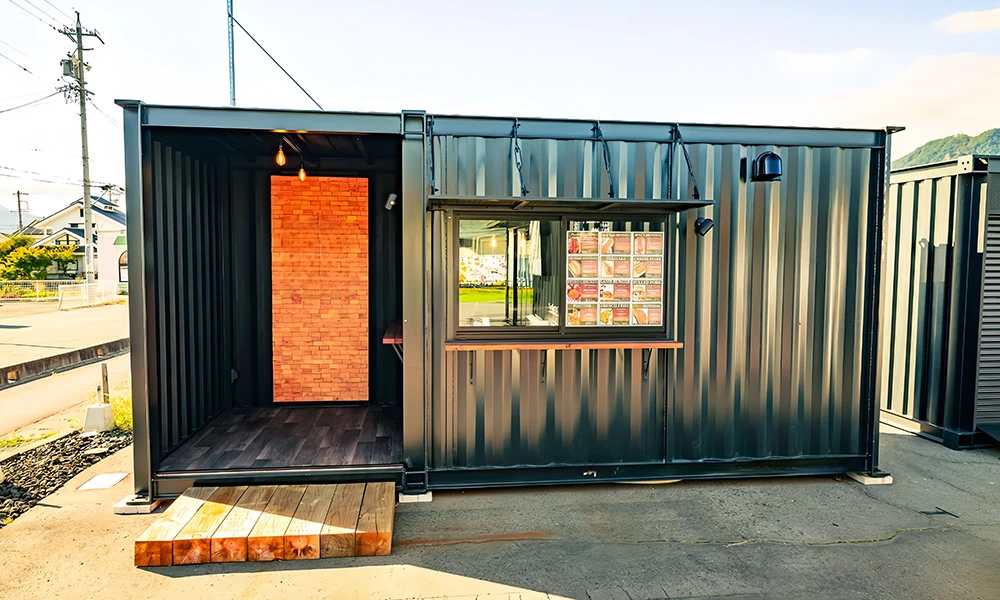
Kitchen and service area renovations
- Customizable based on menu and service model.
- Configurable with a bar counter, specialized equipment, sinks, storage cabinets, and more.
- Provide efficient and smooth workflows to improve operational efficiency.
Customized signage and signage
- We offer a wide range of services, including illuminated signage, logo displays, and menu boards.
- Boost brand visibility and enhance customer recognition.
- The effect is particularly noticeable at night, helping businesses become iconic landmarks.
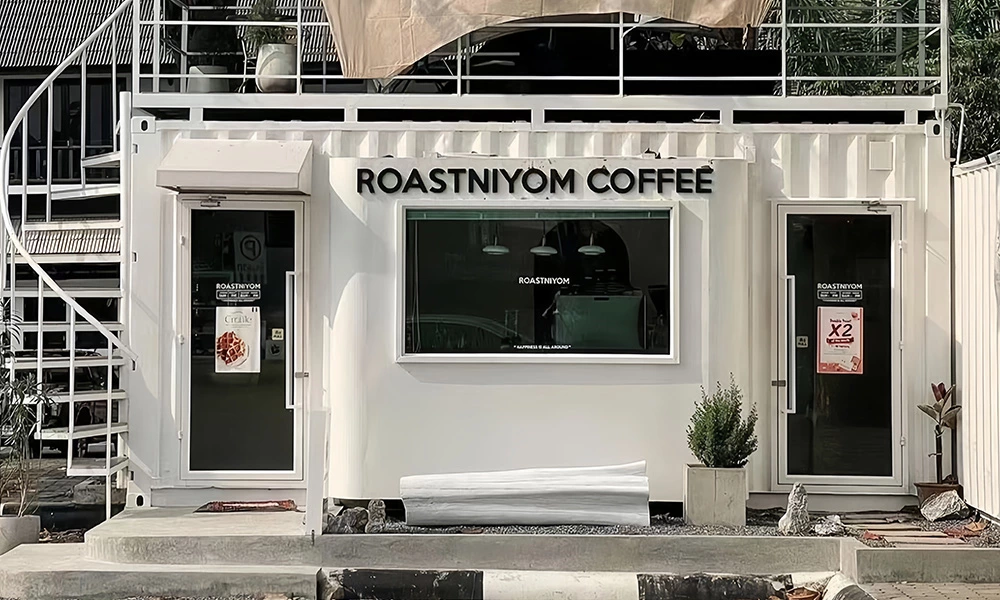
Interior and exterior decoration
- A variety of finishes are available: high-quality paint, wood paneling, metal cladding, and more.
- Exterior styles can range from industrial modern to minimalist and warm, perfectly tailored to your brand's style.
- Decorative materials are not only aesthetically pleasing but also enhance the durability and protection of the container.
How do container shops help businesses grow?
In a highly competitive business environment, container shops offer differentiated business strategies by reducing costs, improving efficiency, and enhancing individuality, helping businesses overcome bottlenecks.
1. Reduced entrepreneurial risk and reduced financial pressure
Traditional retail faces challenges with high rents and long renovation cycles. These factors require significant upfront capital expenditures, leading to potentially irreversible losses if the market fails to respond well. Container shops, on the other hand, not only offer low initial costs but also allow entrepreneurs to test their business models with minimal investment through a rental model, mitigating risk.
2. Quickly respond to market trends and capture traffic dividends
Whether it's peak holiday traffic in shopping districts, seasonal consumer trends (such as summer night markets and winter bazaars), or temporary large-scale events (such as concerts and exhibitions), container shops can be deployed quickly to capture traffic. Their portability allows businesses to "follow the flow of customers" and maximize market opportunities.
3. Create Brand Memories and Enhance the Consumer Experience
Amidst a sea of homogenous commercial spaces, the industrial-inspired exterior and customized design of container shops serve as "walking advertisements," attracting consumers of all ages to check in and spread the word, helping brands establish a unique identity. Furthermore, flexible interior layouts can optimize the consumer experience. For example, small retail stores can enhance the fun of browsing through compact designs, coffee shops can add outdoor terraces to enhance the casual atmosphere, and sports club shops can enhance the customer satisfaction of athletes by offering a one-stop service offering "equipment, supplies, and rest."
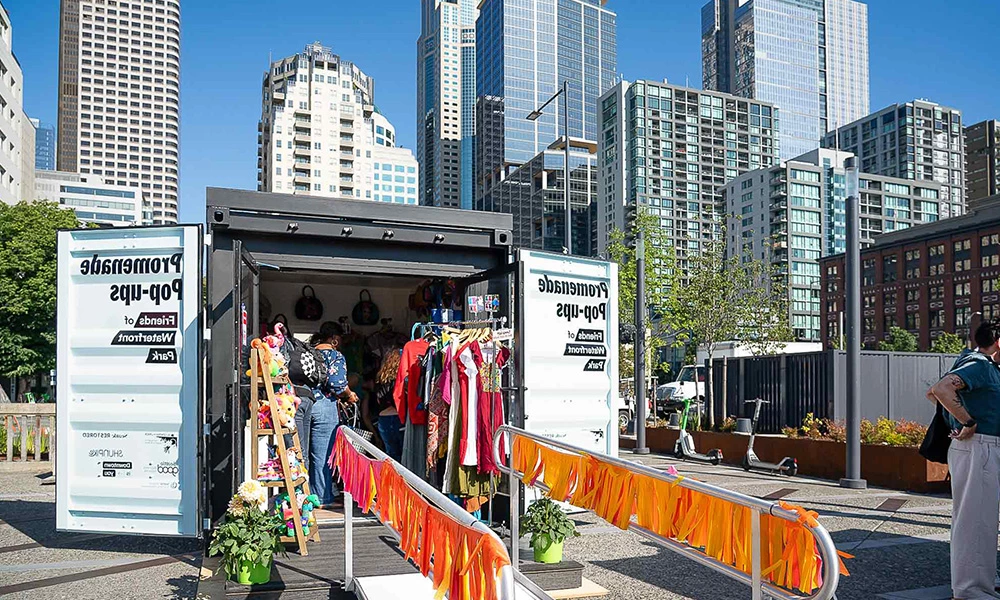
Container Shops, Opening a New Future for Commercial Spaces
Container shops are not only a "low-cost business solution" but also a "new business model that combines creativity and practicality." They align with environmentally sustainable development trends while meeting the current demand for flexibility and personalization. Whether entrepreneurs, small and medium-sized brands, or large enterprises looking for temporary projects, whether in leisure consumption, retail operations, or sports services, container shops can all find suitable business solutions. With the continuous innovation of new retail models, container shops are poised to shine in more commercial scenarios, becoming a vital force in unlocking new business possibilities.
